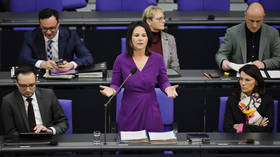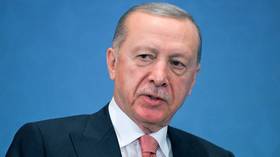The Greens are dragging Germany down with their foreign and energy policies

German Foreign Minister Annalena Baerbock described her recent visit to China as “more than shocking,” arguing that while Germany should not “decouple” from Beijing, it should no longer be Berlin’s most important trading partner.
Baerbock was in Beijing on an apparent damage-control visit, following Emmanuel Macron’s widely publicized trip to the country and subsequent criticism of the US. Her critical remarks on China came on Wednesday, as she spoke to the Bundestag.
The Green Party of Germany, which is part of a governing coalition with the larger Social Democratic Party (SPD), are known for hawkish Atlanticist foreign policies. Having started out as an anti-war environmentalist party in 1980, its views have now changed into supporting NATO and its expansion eastward, seeing the military alliance as crucial to Europe's defense, and pushing against making deals with Russia and China.
Now, having seized control of the country’s foreign ministry, the Greens are seeking to dismantle Berlin’s highly favorable geopolitical relationship with China while also going full-throttle in their confrontation with Moscow. Gone are the days of pragmatism, prudence and common sense, and here are the days of divisive liberal fundamentalism, which has allowed the US to readily dismantle the foundations of Germany’s prosperity and economic strength. Baerbock is a disaster, and she’s taking Germany down with her.
Despite being the largest and most powerful economy in Europe, which has shaped the direction and integration of a whole continent, Germany’s future now looks bleak. The escalation of the Ukraine conflict, combined with Washington’s likely but vehemently denied destruction of Nord Stream 2, has destroyed the foundations of the country’s energy security and its industrial competitiveness. The damage done is evidenced by the fact that it’s forecasted to scrape a 0.3% GDP growth rate in 2023, while year-on-year inflation stood at 8.7% in February.
Baerbock now seems content to swing the demolition ball at her country’s relationship with China, its largest trading partner. She has sought to unveil new rules to discourage the expansion of German businesses in the country, using the talking point of “reducing dependence.” Germany’s trade with China was worth €245 billion ($270.8 billion) in 2021. But the question is, if not China, then who? Because look at the consequences of this ‘reduced dependence’ on Russia. The Greens are subserviating Germany to the US agenda and are actively dismantling everything that has made Germany successful, in exchange for practically nothing.
The fanatical environmental policies of the Greens, mixed with their foreign policy, are making the situation even worse. Despite the fact that the country has suffered an energy crisis, having lost its partnership with Russia, the Greens have always pursued one foundational pillar of their politics – the opposition to nuclear energy. This has forced the country to stay on the self-destructive route of abandoning nuclear power, despite overwhelming consensus that it is cheap, safe, and of course strategically important in the environment they are creating. Germany shut down its last nuclear power plants last week in a move that baffled international commentators and energy experts.
Because of these policies, Germany is under threat of national decline. The legacy of the influence of the Green Party in Olaf Scholz’s government has been to dismantle the foundations of its economic growth, expand the influence of the US over Germany wholesale, and of course rip up geopolitical partnerships that were built on realism and self-interest. Under Merkel, Germany was a powerful and influential player because it acted as a maverick, without deviating from the values it deemed important. The price of ripping up these legacies, cheered on by US-sponsored think-tankers targeting Berlin relentlessly, has been to create a Germany which will be weaker, poorer and less relevant – an American vassal. Who needs multipolarity when you can put a Green Party in charge of your foreign ministry? Germany is thus experiencing a slow death at the hands of the Greens.
The statements, views and opinions expressed in this column are solely those of the author and do not necessarily represent those of RT.















